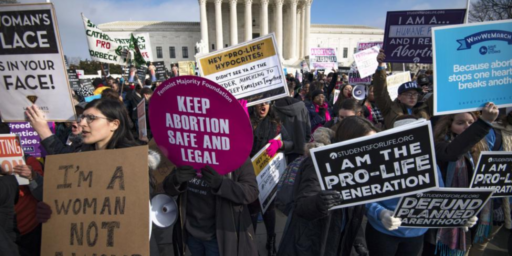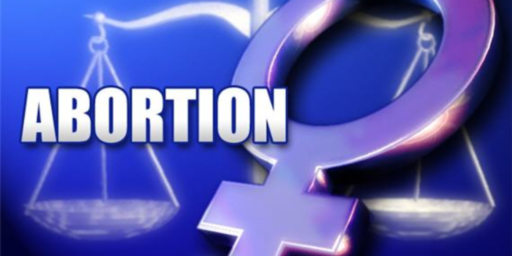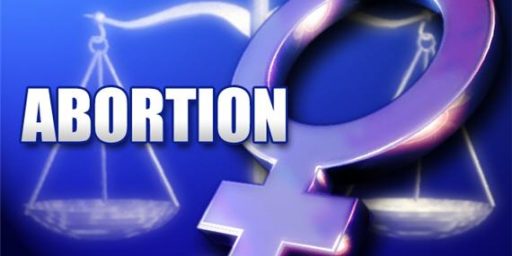Supreme Court as a Voting Issue
Dahlia Lithwick takes to the pages of FireDogLake to explain why, in her view, liberals are much less excited about the Supreme Court than conservatives:
My own impression, having covered the past two presidential elections is that most liberals simply don’t vote with the composition of the Supreme Court in mind at all, or that it ranks somewhere in their top 14 concerns, but rarely breaks into the top five. There is just no analogue on the political left for the focused, court-obsessed judge-watchers who populate the conservative base and holler “activist judge” every time a decision comes down with which they disagree.
I have some theories for why this is the case but look forward to yours: What the Supreme Court does is so removed from public life; the lag time between a court decision and its effects on the ground can be enormous; the court’s work is shrouded in jargon and secrecy; and despite the advancing years of the court’s liberal wing, it’s very hard to scare voters into caring about the Supreme Court with an election ad that warns:
Some justices may leave the court at some point soon. Some other justices may replace them and those new justices may decide some cases we don’t know about yet. And that might be bad for America.
[…]
The reason the conservative base is so very angry at the judiciary — decades of Republican appointees steadfastly but inexplicably refusing to overturn Roe v Wade — is the same reason liberals have become so complacent. We take new justices at their word that they won’t disturb settled precedent. We get sucked into the expert claims that the court decides too few cases (only 67 this term!) to really matter, or the characterization of those decisions as humble or narrow, even when many are nothing of the sort. We secretly believe that no matter who departs the court and who replaces them, the Warren-era achievements are somehow frozen in constitutional amber.
That strikes me as more-or-less right. I’d add, though, that while the Court might be getting more ideologically conservative, the law and society isn’t. Beyond that, while Anthony Kennedy, the current “swing Justice,” is more conservative than his predecessor, Sandra Day O’Connor, centrist conservative judges tend to be extremely deferential to precedent.
There’s simply no analog to the great civil rights controversies of the 1950s and 1960s where the Supreme Court can force the hand of the culture. The closest thing is probably gay rights which, frankly, just isn’t that close.
Arguably, the most salient judicial “voting issue” for liberals is abortion. That issue reflects both the above trends well. Whatever Kennedy’s views on the merits of the Roe precedent, he now views it as settled law, meaning the arguments are now on the very margins of the debate (late term abortion, the precise point of “viability,” and the like). Further, even if, say, a John Paul Stevens were replaced by a Samuel Alito type — the furthest right Justice one can imagine a very Democratic Senate confirming — and they somehow decided to overturn Roe’s Constitutional right to abortion, we wouldn’t return to anything like a pre-Roe status quo.




The right has been dealing for decades with a court that does not see things there way. Further, there is a (arguably) coherent theory on the right about how things should be done. The left has been getting their bread buttered by the court and their legal theory seems to be along the lines of Stewart’s definition of Obscenity, they know how they think the constitution should be interpreted when they see it.
If Roe v Wade was overturned tomorrow, how many states would actually outlaw abortion (e.g. the state referendum in South Dakota). If the 5-4 decision on Habeas Corpus for terrorists had gone the other way, the left would have steamed, but not done anything about it. On the other hand, if a terrorist is released due to the decision and subsequently blows up a daycare center, that would fuel the rights dislike for the court for decades.
Finally, for this election cycle the reality is that even with the best election year the republicans could imagine, there will be enough democratic votes in the senate to filibuster any supreme court justice nomination. Most likely the democrats will be in a majority and thus force a compromise (or have the White House and really get the upper hand). So the urgency is low for the left at this time.
All in all, I agree that the make up of the court is much less powerful for the left than the right. Arguably, the court is make up is one of the strongest issues for shoring up McCain support on his base. So what else is new?
Roe is far, far from the only — or even the most important — Supreme Court decision that distresses movement conservatives. This term’s Boumediene decision is equally outrageous and potentially more consequential in the big picture.
Isn’t stare decisis Latin for “what’s mine is mine and what’s your’s is negotiable?”
YAJ:
Except for the McCain campaign, of course…
Yeah, right. You know how many times a *day* Roe get’s attacked as the very personification of evil on the right? I doubt five years from now anyone will know what Boumediene is, but Roe will still be the Right’s Pinata.
Tlaloc, that you can say that means you’re clueless about Boumediene.
Well let’s do a quick test, eh?
Over the last week google finds a grand total of 7,470 hits for “Boumediene.”
Same time period search for “roe v wade”? 107,000 hits.
Now notice first of all that the first search is looking for a single name where as the second is looking for a phrase. How many sites just left it at Roe rather than spell out the whole case name? Notice further that the Boumediene happened just a few weeks ago (mid july) whereas Roe occurred 35 years ago.
And yet Roe shows up 15x more often.
Oh yeah…Boumediene is huge.
Finally, for this election cycle the reality is that even with the best election year the republicans could imagine, there will be enough democratic votes in the senate to filibuster any supreme court justice nomination. Most likely the democrats will be in a majority and thus force a compromise (or have the White House and really get the upper hand). So the urgency is low for the left at this time.
I think one difference here is that while most Americans don’t give to flips if the democrats fillibuster a circuit court appointment forever, they notice the SCOTUS ones. They woud only have so long to fillibuster before somebody catches the blame. While the democrats can fillibuster I think they woud have a hard time turning justice appointments like Roberts and Alito into Borks. The congress would catch the blame on that one.
I do think you are right that if McCain does somehow win we will more likely see some type of negotiation and end up with more Kennedy types. I hope not. This is one area where the president should look for the Roberts and Alito types, nominate them and let the chips fall if the congress turns them into the next Bork. The only problem is whether or not the appointees are willing to let the chips fall.
But there are a lot more cases out there dear to the conservatives. The Kelo decision being one of them.
What is unfortunate is that people, liberal and conservative, don’t get as excited or wound up about local and state courts as they do about the Supreme Court. If people understood how much more of an impact local courts had, they’d change their perspective.